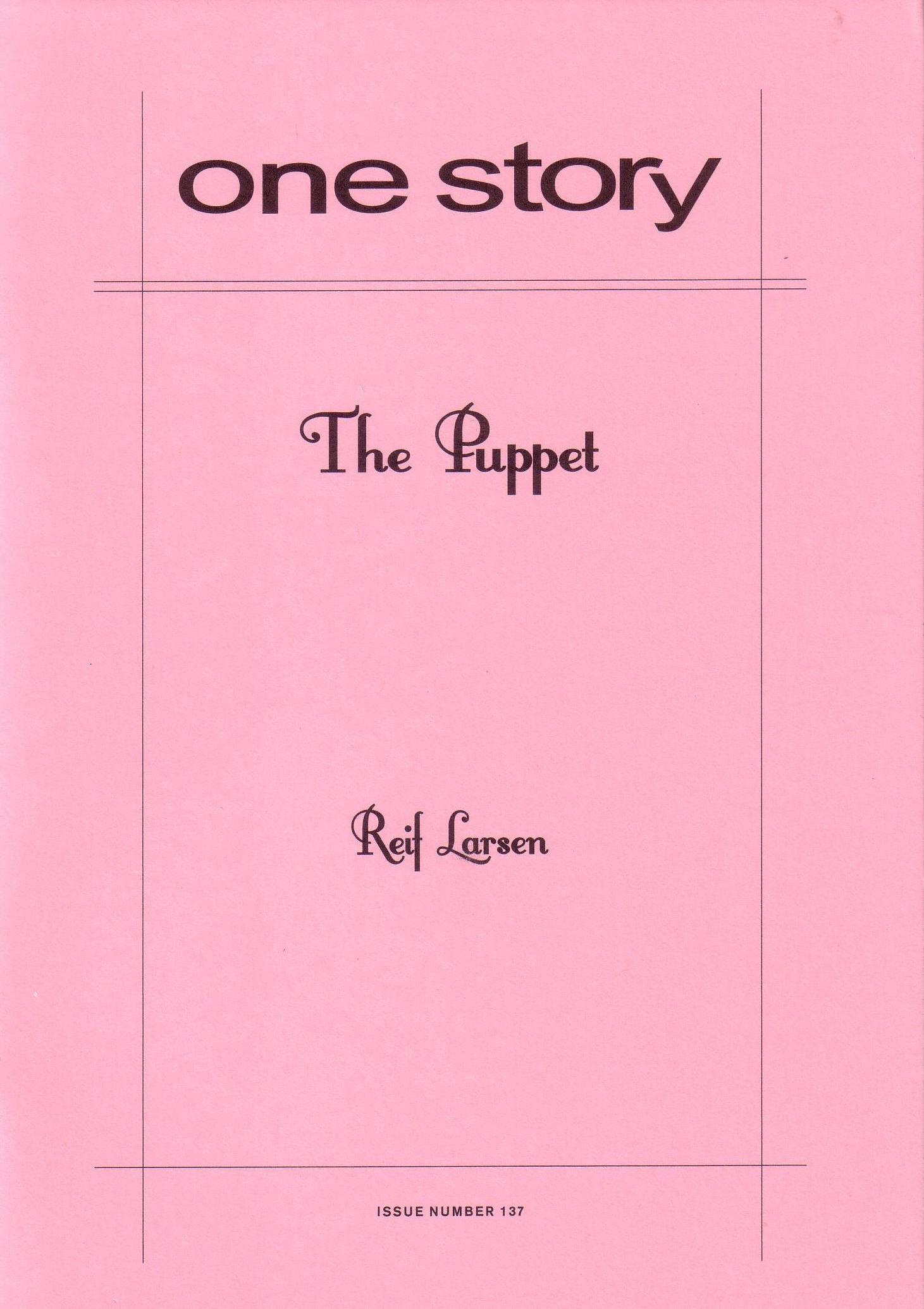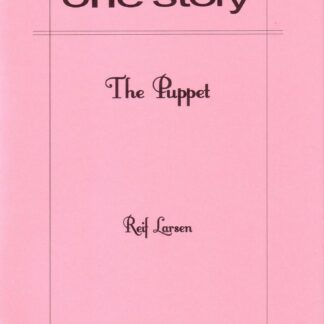
The Puppet
79 in stock
Excerpt
When Valise first checked in to the Holiday Inn, the lovely receptionist in the oversized sweater gave him the key to his room and said very kindly, “Please, M. Retour, if you will avoid windows at all times. Or else sniper will shoot you dead and…” She sighed and parted her hands to indicate the predicament they were all in. Valise stared, struck by the restrained elegance of this gesture, the hovering kiss of palms into a weary bloom of fingertips. The air in the lobby was damp and sour; he could smell the faint paw-back stink of cordite entwining with the scent of the single, despondent lily in the vase on her desk. Suddenly, he was overcome with the electric, almost toxic, sensation that he had already experienced this precise pairing of pantomimed resignation with the lingering scents of damage and inflorescence. He had never been to Sarajevo before, of course, nor had he ever met this woman, but the sense of déjà-vu was so violent and true that Valise shivered, and without thinking, tapped the call bell in front of him.
Ding!
“Yes?” the woman said, blinking. This, too had happened before.
Reif Larsen
Reif Larsen is the author of the novel The Selected Works of T.S. Spivet. He is at work on a book about New Jersey, puppets, and particle physics. He lives in Saugerties, NY.
Q&A by Hannah Tinti
- HT: Where did the idea for this story come from?
- RL: Several years ago, I was travelling through Sarajevo and I came upon the Vijecnica, or National Library, a beautiful old building whose architecture drew upon both Austro-Hungarian and Ottoman influences, much like the city itself. The library was still burned and gutted from when it was fire-bombed during the war over a decade before. Despite the rubble and crumbling walls, there was an art exhibition being displayed in the building’s rotunda. I was incredibly moved. There was something very human about seeing this delicate artistic gesture amidst the clumsy brutality of war. You could feel the ghosts of all those lost books haunting the corridors.
- HT: What was the most challenging aspect of writing this story?
- RL: Finding the balance point of Valise’s character. He was at first French, which didn’t seem right, and fleeing a broken relationship, which also didn’t seem right. It’s amazing the settling and shifting that goes on when we write our stories. It’s a long process of listening to what the story demands, trying something new, then seeing how it lays. I wish there was a linear path from A to B but usually you have to circle the mountain a few times.
- HT: Have you ever spent time in Sarajevo? Why did you choose to set the story there?
- RL: I’ve only been to the city once though I’ve travelled around the Balkans a fair bit. The city really got under my skin. I couldn’t stop thinking about it after I left—the minarets, the reverberations of the Adhan, calling the Muslims to prayer, the tight-thighed mountains that surrounded the city in all directions save one—a geography which allowed the Bosnian Serbs to terrorize the city from above for four brutal years. Sarajevo has always been a place of confluence, a meeting of cultures, the edge of the Ottoman Empire, and it remains the western-most Islamic stronghold in Europe. For hundreds of years different peoples have lived side-by-in peace within the narrow alleyways of the city, but it has also been the site of much brutality. The first World War started here with the assassination of Archduke Ferdinand by a member of the Black Hand. During the Bosnian War, the city endured the slow death of the siege year after year without buckling. Today, Sarajevo is still the fault line between east and west—as evidenced by the heavily-guarded slightly surreal Saudi Arabian mosque-compounds and all of the intelligence agencies operating in the city.
- HT: Brusa is such a large and exceptionally engaging character. Where did he come from?
- RL: He is based on several hyper-exuberant central Europeans I have met over the years. You were never sure where they stood, what kind of secret organizations they were a part of, but in the end you didn’t really care because their enthusiasm was infectious. You wanted to be around them. Sarajevo is filled with many of these characters. Thoughtful smokers. Amateur historians with murky pasts. Much of Brusa’s appeal comes from his mystery, and like Valise, I believe most of us are searching for a little snuff-pinch of mystery whenever we pick up a short story.
- HT: Can you talk a bit about Valise’s déjà-vu throughout the story?
- RL: I’m very interested in the body as an electrical machine and how our wiring affects our experience and self-conception. Déjà-vu is this stutter step of comprehension; due to a glitch in our wiring, we get signals on a delay so we immediately assume we have been here before. But I also feel like déjà-vu is something much deeper—a fleeting pointer to an infinite experience: we have already experienced everything already, yet we don’t fully realize it. Sounds Borgesian, or Buddhist, or Kantian, I know, but this knowledge of complete experience haunts me. It’s interesting that Valise is plagued by a déjà-vu when he goes to this horrific city under siege. His body is trying to retreat to familiar ground, but in doing so, it’s implicating itself in a war. If he has already been here, then he is already complicit in the violence.
- HT: At Celo’s funeral party, Thorgen describes the Copenhagen Divide to Valise—can you explain why you decided to include this in the story, and why you often weave fiction and science together in your work?
- RL: I am fascinated by our ability to live with paradox. If everything else seems to function relatively well, then we accept and eventually ignore these glaring inconsistencies. Our brain has this amazing capacity for bifurcation and isolation; I suppose it is a survival instinct, like if you are trapped in the woods with a gangrenous leg you are going to keep going and ignore the rotting leg. It is happening in theoretical physics right now, this rotting of the leg—we have models for explaining how the extremely small behave and how the extremely large behave, but they absolutely do not work with each other. We have not yet found the seam. And is it important to find the seam, if everything else works fine? Well, yes. This same kind of isolationist thinking leads to war—“if we only do this here, this one time, then it won’t apply under these rules.” We are local creatures and we are creatures that love to live by exceptions to the rule.
- HT: Why did you choose to title this story “The Puppet”? What do you think the puppets of Thorgen & Jean Louis symbolize for Valise?
- RL: Titles are difficult, like wrestling a bear when armed with a pair of pantyhose. Not easy. You are trying to do too many things at once and nothing at all. The story was named “The Zoo” for awhile, and I liked this but as the story shifted beneath my feet and Thorgen and his puppets came more to the surface, I thought the notion of puppetry, of who controls who, of whether we are automata or free-willed individuals became the central hinge of the story. My next novel is about puppets so I’ve had puppets on the brain for some time. I am obsessed with them. How can something appear both lifeless and more human than we are at the same time?
- HT: How long did it take you to complete this story?
- RL: Awhile, though this was strung out over some time. I worked on the piece for a month and then abandoned it for dead. But the story would not compost down and so I resurrected it and with the help of the incomparable Hannah Tinti, worked through some of its entanglements and found the nuggets that needed to stay. I wish there was some visually appealing way to track and show a story’s changes—to show its contractions and expansions, places of fast and slow work; the delicate bird-like tweaks here and there. After all was said and done, it was three months of work end to end, but strung out over six months. Life and work are not linear processes for me.
- HT: What are you working on now?
- RL: I’m working on a new novel—a love story that takes place in New Jersey about an epileptic radio operator. There’s puppets and particle physics in there somewhere. It’s very different than my first book, more of an international thriller. My version of Dan Brown, but a Willy Wonka Dan Brown.
- HT: What is the best bit of advice about writing you have ever received?
- RL: “Show up everyday. You don’t have to solve everything in a day, but you have to show up and say, ‘I am here’ and do your work. Your work is only as strong as your will to be present.” A French prostitute told me this on my seventeenth birthday and I believe she was mostly right. Writing fiction is such a bizarre life pursuit you have to come up with strange excuses to devote your life to it, as opposed to actually doing something useful, like developing the cure to river blindness. But on the days when I am not in my office, when I am not engaged in that delicious struggle of working things out on the page, I inevitably feel lost. I think writers should always hunger for that struggle, you should want to be working out the furious kinks of your narrative, even if it is driving you fucking insane. Everything else is just the spaces in between the words.
